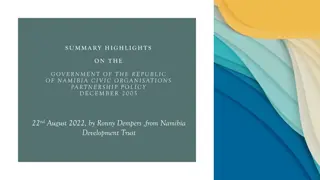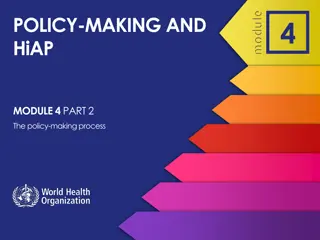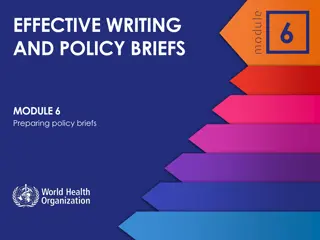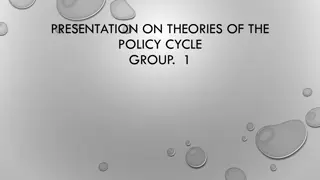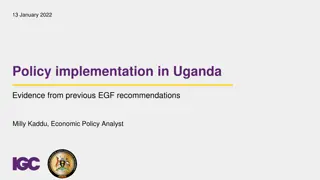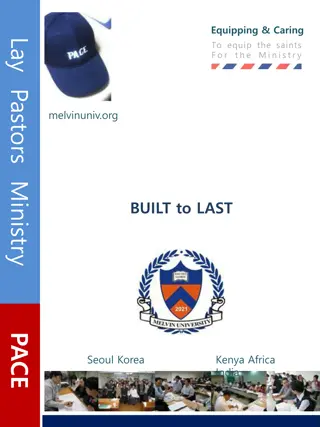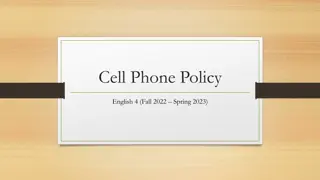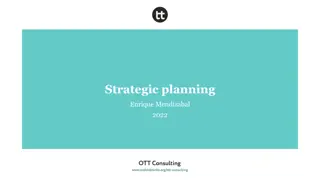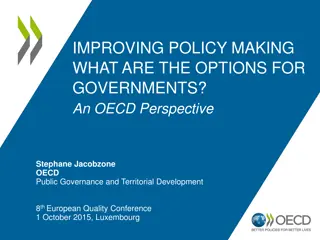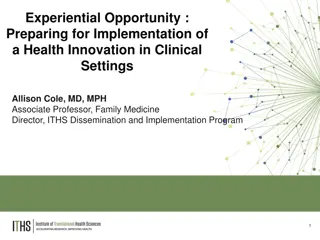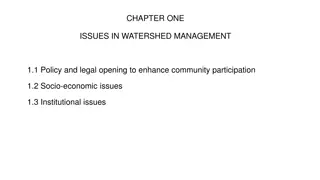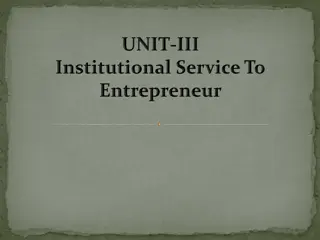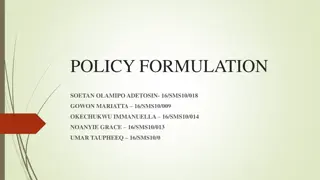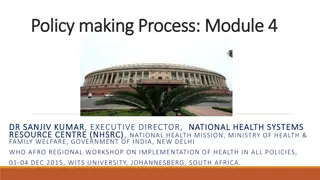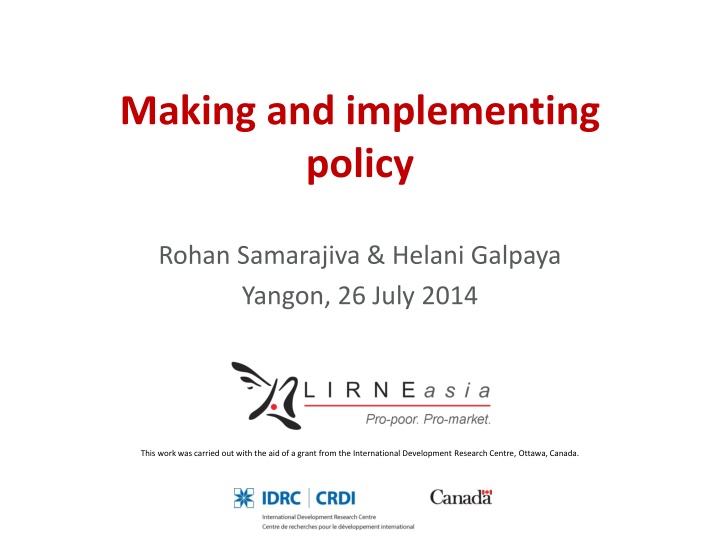
Challenges in Policy Implementation and Building Effective Organizations
Highlighting the challenges in implementing policies to achieve objectives set out in laws, focusing on areas such as building effective organizations, e-governance, and leadership. The case study discusses issues faced in advancing e-government initiatives, diagnosing roadblocks, and proposing solutions for successful policy implementation with examples from Sri Lanka.
Download Presentation

Please find below an Image/Link to download the presentation.
The content on the website is provided AS IS for your information and personal use only. It may not be sold, licensed, or shared on other websites without obtaining consent from the author. If you encounter any issues during the download, it is possible that the publisher has removed the file from their server.
You are allowed to download the files provided on this website for personal or commercial use, subject to the condition that they are used lawfully. All files are the property of their respective owners.
The content on the website is provided AS IS for your information and personal use only. It may not be sold, licensed, or shared on other websites without obtaining consent from the author.
E N D
Presentation Transcript
Making and implementing policy Rohan Samarajiva & Helani Galpaya Yangon, 26 July 2014 This work was carried out with the aid of a grant from the International Development Research Centre, Ottawa, Canada.
Objective Highlight challenges of building effective organizations to achieve objectives set out in LAW and implement POLICY In case of a law that requires action by private parties (e.g., offering of mobile telecom services), regulation Where direct government action is required 2
E Sri Lanka program architecture E leadership E government E society E business Infrastructure 3
Diagnosing road blocks Existing organization, CINTEC, was unable to perform apex function New agency? What to do with old one? Coordinating with multiple government agencies to advance e government was seen as the greatest challenge Authority higher than individual Ministers? 4
Solution Company limited by guarantee, fully owned by the government Private-sector culture from inception Advertisements issued during holidays when expatriates were back in Sri Lanka Interviews for leadership positions conducted over video links Private sector salaries and benefits COO of leading IT company recruited to lead ICT Agency 5
Policy Implementation Seed grant to get the ICT Agency (ICTA) started Buildings, people, resources Project Preparation stage Prepare necessary documents WB + ICTA staff work on final project details (project appraisal document) that is approved by the WB Pilot projects: for some quick wins eHRM (electronic Human Resource Management) Agricultural Price Information system A few community access tele-centers 6
From 4 programs more Re-Engineering Government Services Technical Architecture, standards, specifications Information Infrastructure ICT Leadership & Institutional Development ICT Capacity Building eSociety ICT Investment and Private Sector Development 7
Finally, signing large grant (USD 53 million grant) agreement Under a new government About a year after ICT Agency was Formed 8
E-Society Aim: to develop ICT applications that help the most disadvantaged Primary Mechanism: e-Society Dev. Fun source the best ideas from developers, NGOs through competitions give funding, mentoring Move Business Process Outsourcing to rural areas Companies in Colombo outsourcing to rural Some success stories E.g. audio program to aid reading by visual disabled persons 9
Infrastructure Networks: A govt network: to link central & regional offices (Done) Extension of the fiber-optic network and connectivity to rural areas (not done) Access points via Telecenters Telecenters: 500+ planned, primarily for rural areas Private sector operated; initial capital from govt. Initially selected competitively later changed A success? 10
ICT Human Resource Development Training government employees Mass trainings Training private sector Linked to the ICT Capacity Building Fund Training citizens Select certified training organizations They run ICT Driving License basic certification program Weekly TV program Indicated success: increased ICT literacy rates 11
E-Business: to develop the ICT private sector in Sri Lanka Aim 1: Increase investment in the sector. Brand Sri Lanka as outsourcing destination increase firms exporting more services (software, BPO..) Aim 2: Use e-Government procurement as a way to develop local ICT private sector companies Activities: Bring industry together formally: umbrella association Create a vision: strategic planning process Brand the country as an outsourcing destination Take firms to trade shows increase visibility Increase skills of Sri Lankan firms: ICT Private Sector Capacity Building Fund Create awareness of BPO sector among people Today a success story 12
E-Government Model: Re-engineer government services Get private sector (software) companies to implement the software to automate Prioritized list of e-Gov services Ranked by impact, usage and feasibility Entrenched interests inability to implement projects at the top of the list End up doing what you can Perceptions of the ICT Agency As outsiders. Not software experts. Not government either ICT Capacity in Government : non-existent Chief Information Officer appointed at each govt. office A long process Use this person as champion of process 13
Much talk, no early results Mismatch of interests, resources Money (at ICT Agency) Technical Knowledge (ICT Agency) Ownership of the service (Government Dept/Ministry) Disruptions to work during implementation (Dept./Ministry) High likelihood of failure Long time needed from concept to finish Study processes; re-engineer them Identify system requirements Procurement process (int l) Implement the system E.g. ePensions project Result: 2.5 years after inception, no e-Gov project implemented But HUGE expectations Media, others: setting expectations 14
Working outside the government system: 1919 Government Information System Background: need for quick win e-Gov project Long time before e-Gov services become reality. To counter negative perceptions Lack of information HOW TO ACCESS GOVT. SERVICES Multiple trips to government office, wasted time, costs Low internet use websites not a full solution Solution: a call center Polite, helpful, fast Service-based, not department based Choices Train govt. workers to run a call center Something faster? 15
Tapping the existing capacity at call centers Service US/UK markets staffed at night Empty during day time cheap, excess capacity World class technology already existing Necessary conditions: information on govt process Resistance, lack of interest, lack of vision Use interns get each ministry to check. Competitive procurement Rules vs. Rules But how can private sector people answer government questions ? Under the radar implementation Surprise soft launch 16
First success story in e-Gov (and only success, for many years) Call volume increase each year 17
Turn-around in eGov Re-thinking how systems are designed Modular (break down into parts) Open source In-house vs. outside development Change in skill set of e-Gov team Serious techies hired Chief Technology Officer Appointed Local industry taught how to bid, manage contract risk 20
Today. UN eGov rankings Sri Lanka made biggest jump (41 places) 115th in (2012) 74th in 2014 Actual service delivery: Since Sep 2013 Hundreds of e-Services launched 21
High salaries + uncontrolled publicity + high expectations Recipe for failure? You acquire detractors: People who applied for jobs, didn t get hired People who didn t like staff getting high salaries People who applied for pilot project grants, but didn t get (Opposing) political parties .. And when people over-promise/over-publicize Create unmet expectations Gives voice to detractors 23
Could things have been done differently? Could high salaries have been avoided? Important to attract Sri Lankans living overseas Important to attract private sector experts Could the CEO have been more empowered within government Was not at Secretary level: practical difficulties due to protocol Could ICTA have been more media savvy? Yes; today social media but then What other variables were available to play with? 24
Implementers need policy direction during implementation, not just at the beginning Population register A funder s objections to religion/race being recorded Existing law/practices requires these (e.g. in inheritance) Changing this not a decision for the ICTA But technology workarounds possible Free & open source Should they be given preference in procurement 25
The Re-engineering Government Steering Committee that never was implemented Senior civil servants Secretaries (~Deputy Ministers) of important departments [e.g. Ministry of Finance, Ministry of Public Administration, etc. Other senior actors Taking policy level decisions With input from ICTA, industry Meeting regulatory, not annually A vacuum when ICTA faced challenges Politicians stepping into that vacuum ICTA: the apex ICT policy making body for Sri Lanka and the implementer of the e-Sri Lanka vision 26
Why influence of political power can be good Politicians: voice of the people They SHOULD prioritize policies To speak up for the implementing agency When it comes under attack In theory, it opens doors Powerful people at the top Needed for cross sectoral agency Move from Ministry of Science and Technology Prime Minister s Office President s Office 27
Why close ties to political power can be bad Politicians need wins during their tenure Need to take care of their constituents jobs Leading to local optimums, but not system-wide optimal solutions May not take technocratic input into consideration when making decisions Results: Requests/orders to implement projects not in priority list Changes in ongoing project design (telecenters) Appointment letters for people 28

